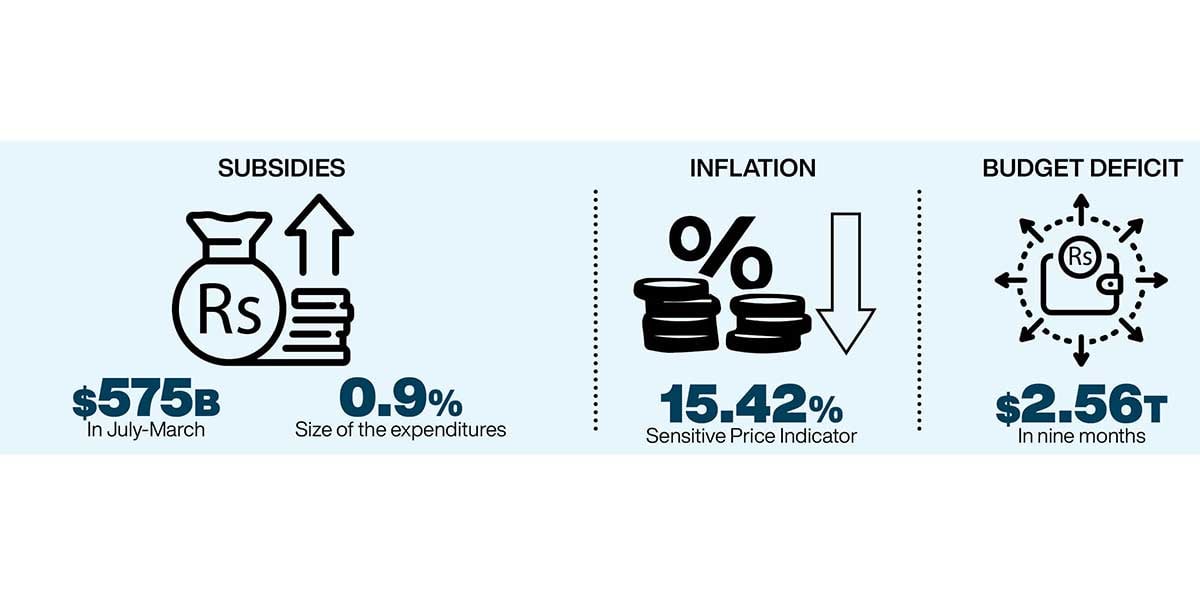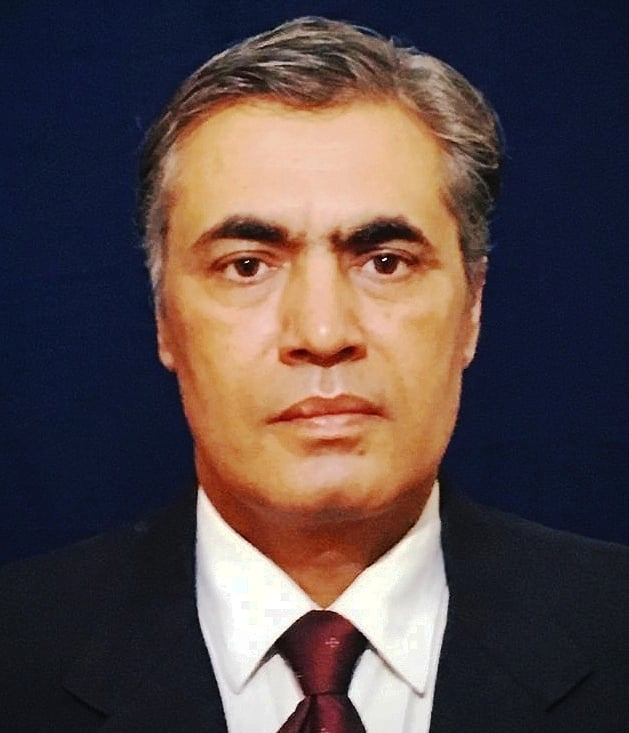
A tsunami of price hikes is imminent, as the new government has agreed on reversing subsidies to continue a loan programme agreed with the International Monetary Fund (IMF). The people of Pakistan will feel the brunt after this withdrawal because the previous government was passing on subsidies worth billions of rupees to avert the inflationary pressure in the wake of an increase in the international oil and commodity prices.
According to the Finance Ministry, the previous government granted subsidies of Rs575 billion during the first nine months (July-March) 2021/22, compared with Rs204 billion in the same period of the last fiscal year, showing a massive growth of Rs182 billion.
The size of the expenditures under the head of subsidies came at 0.9 per cent of the GDP during the first nine months of the current fiscal year, compared with 0.4 per cent in the corresponding period of the last fiscal year.
Finance Minister Miftah Ismail said that the government cannot afford subsidies.
“We cannot afford to give subsidies that we are giving. So we need to curtail them,” he added.
Former prime minister Imran Khan had set a ‘trap’ for his successors through heavy subsidies on fuel. However, some targetted subsidies should remain for Pakistan’s poorest, amid rising global prices, he added.
Soon after being appointed as the finance minister, Ismail had said that the subsidy allowed for petrol for the months of May and June would cost Rs96 billion, and the “government cannot bear this burden”.
The previous Pakistan Tehreek-e-Insaf (PTI) government in February decided not to increase the fuel prices. Instead, the prices were frozen till June 30, 2022. The decision was taken to prevent the people from a sharp rise in petroleum products prices in the international market, especially after the beginning of the Russia-Ukraine war.
Former finance minister Shaukat Tarin argued that the subsidy was granted to facilitate the people and it was already calculated with the other economic indicators to avoid any setback to the economy.
In a statement, Tarin said that the PTI government met the IMF’s targets for the release of the seventh tranche. The IMF had expressed concerns over provision of subsidies on fuel and electricity.
“We advised them [IMF] that subsidies were necessary due to the inflationary pressures on the common man and were fully funded,” Tarin added.
On April 24, 2022, the IMF through a press statement made it clear that the Pakistan government has agreed to rollback unnecessary subsidies.
“We had very productive meetings with Finance Minister Miftah Ismail over Pakistan’s economic developments and policies under the Extended Fund Facility (EFF) programme. We agreed that prompt action is needed to reverse the unfunded subsidies, which have slowed down the pace of discussions for the 7th review.”
“Based on the constructive discussions with the authorities in Washington, the IMF expects to field a mission to Pakistan in May to resume discussions over the policies for completing the 7th EFF review. The authorities have also requested the IMF to extend the EFF arrangement through June 2023 as a signal of their commitment to address the existing challenges and achieve the objectives of the programme,” according to the IMF.
Finance Ministry’s former spokesman Muzammil Aslam said that the fuel and electricity subsidies had helped the consumer inflation to come down 2.2 per cent in February, compared with the previous months.
The PTI government had announced a reduction in fuel and electricity prices, despite a steep rise in the international oil prices, which would provide a relief to the common man.
“The previous government was taking additional measures to keep the consumer inflation under control,” he said, adding that all taxes on petrol had been abolished and that all benefits from the reduction in oil prices were being transferred to the people.
The official statistics of the Pakistan Bureau of Statistics (PBS) revealed that the inflation based on Sensitive Price Indicator (SPI) came down to 15.42 per cent on a week-on-week (WoW) basis by April 21, 2022, compared with 18.09 per cent by the week ended February 17, 2022.
A leading body of business representatives in Pakistan has expressed serious reservations on the subsidy provided by the previous government and demanded the new government to immediately withdraw them to avoid complete economic disaster.
Pakistan Business Council (PBC) Chief Executive Ehsan Malik, in a letter to Prime Minister Shehbaz Sharif highlighted the economic challenges.
“There are, as you are aware, several very critical choices that your government needs to make in the next few days. Foremost among these is restoring fiscal prudence, stemming the pressure on the foreign exchange reserves and reviving the IMF programme,” the letter read.
“For the medium- to long-term, we believe a Charter of Economy with cross-party consensus is essential. In this connection, we hope to have a continuing dialogue with you and your team,” it said.
The PBC suggested the new government to avoid further populist measures that also result in increasing inflation.
“Withdraw the general subsidy on fuel and replace it with the targetted assistance through Benazir Income Support Programme,” the council proposed.
The sharp rise in the grant of subsidies resulted in widening of the budget deficit during the first nine months of the current fiscal year.
According to the fiscal operation issued by the Finance Ministry, Pakistan’s budget deficit widened massively by 58 per cent during the nine months (July-March) 2021/22. The budget deficit ballooned to Rs2.56 trillion during the first nine months of the current fiscal year, compared with Rs1.62 trillion in the corresponding period of the last fiscal year, according to a report on fiscal operation released by the Ministry of Finance.
The surge in expenses may be attributed to populist decisions taken by the previous government in terms of grant of subsidies on the prices of petroleum products and electricity tariff. Further, a huge amount was also spent on social safety net.
Due to a rise in inflation, the State Bank of Pakistan (SBP) has adopted harsh stance regarding monetary policy announcement. The central bank increased the policy rate by 5.25 per cent to the existing 12.25 per cent from the previous 7 per cent in September 2021.
The surge in the prices following the withdrawal of subsidies may force the central bank to further review the policy rate enhancement.
The central bank in its last monetary policy meeting held on April 7, 2022, announced a sharp increase in the policy rate by 250 basis points to 12.25 per cent.
It clearly pointed out the surge in inflation. It said: “… the outlook for inflation has deteriorated and risks to external stability have risen. Externally, futures market suggests that the global commodity prices, including oil, are likely to remain elevated for longer, likely leading to a sharper tightening of the global financial conditions. On the domestic front, the inflation outturn in March surprised on the upside, with core inflation in both urban and rural areas also rising significantly.”A
Catch all the Breaking News Event and Latest News Updates on The BOL News
Download The BOL News App to get the Daily News Update & Live News.








 Read the complete story text.
Read the complete story text. Listen to audio of the story.
Listen to audio of the story.